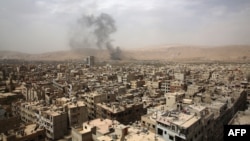Syrian government forces have been locked in a bitter struggle to control strategic ground outside the capital, Damascus, and a highway along the Lebanese border leading to the northern coastline. Attempts by government forces to chase rebels out of the corridor leading north appear to have stalled
Amateur video reportedly shows anti-government rebels, calling themselves the Army of Islam, shelling government positions and firing automatic weapons at them. Anti-government Arab media claims that the Syrian Army has been pushed back along several fronts north of the city.
Syrian state TV, however, claims the government has destroyed tunnels used by rebel groups and to have beaten them back in the suburbs called Ghouta Sharqiya. Arab media, however, report that the rebels have been shelling regions of the capital under government control more frequently in recent weeks.
Saudi-owned Al-Arabiya TV reported Monday that the rebel offensive had also paralyzed a 30-kilometer stretch of the strategic Damascus to Homs highway along the border with Lebanon.
A Syrian government officer told state TV Tuesday, however, that his men have control of the strategic highway and that traffic is moving along the road normally.
Government forces and their allies from Lebanon's Hezbollah have been trying to dislodge rebels from the mountain town of Zebadani, near the Lebanese border. Battle lines have changed frequently, but the town remains a key prize as it controls the corridor north of the capital to the government-held city of Homs.
Khattar Abou Diab, who teaches political science at the University of Paris, tells VOA that Russia's recent deployment in the mostly Alawite government region of Latakia indicates that Moscow is reacting to recent Assad government setbacks which now threaten Latakia.
He said that with the regime's strategic setbacks on the ground (in Idlib), Russia is starting to accept the idea of an offshoot Syrian government, which Iran also supports. But, he notes that it's not quite clear if this “small Syria” extends from Damascus to Latakia, or farther north from Homs to Latakia.
United Arab Emirates-based analyst Theodore Karasik, however, stresses that “one needs to be very careful with on-the-ground victories and setbacks for all actors” in the Syrian conflict. “Today's gains,” he argued,”are tomorrow's losses” in this “see-saw battle.”




